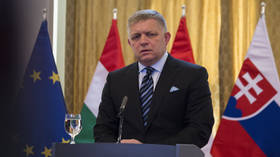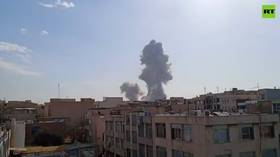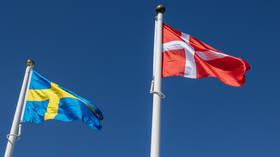US, UK should show Syria chemical weapons intel to Russia - ex-British Navy chief
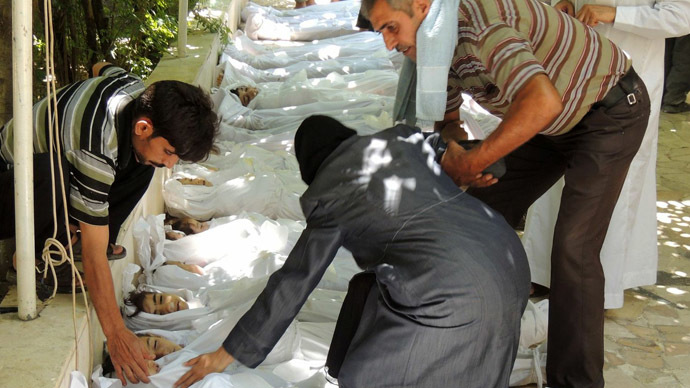
The UK and US need to produce the evidence they claim to have that proves the Syrian regime used chemical weapons, a former head of Britain's Royal Navy, Baron West, told RT.
As the Western powers call for a military strike, Baron Alan West of Spithead, a former First Sea Lord and senior security adviser to the British government, warned that the conflict could spiral out of control and play into the hands of Al-Qaeda-linked rebel groups operating in Syria.
RT:Should Britain take part in a US-led military
campaign?
Alan West: Well, I was very concerned when I came back
into this country to find that we seem to be on a course to go
straight down the track of military action. I was not at all
happy with that, having seen the run-up to the Iraq War. I think
we need to wait for the report from the UN inspectors. It seems
bizarre that we should take action before the UN team that is
reporting on our behalf, to give us the report, so we should wait
for that. It looks as though it will say that chemical weapons
were used, but we must wait and see.
I think also that we need to see the hard intelligence that the
UK and US believe they have to show the regime did actually carry
out this appalling atrocity. If we have got this evidence, I
think we should show that and display it because people don’t
trust this sort of information anymore. Then I think we should
sit down with the Russians and say: “Right, you think it was the
opposition that did it, let’s sit down and look at all this
intelligence here and when we can prove it is one or the other.
Then that will be the position.” If we can prove it’s the regime
we can say: “Right, it’s the regime,” then I think we should go
to the UN Security Council and say to them we believe we need a
Security Council resolution. And I imagine Russia and China, if
Russia has admitted that actually the intelligence and the
evidence shows it was the regime, will abstain.

RT:It's not supposed to be a large-scale assault, unlike Iraq and Afghanistan – Does this justify the allies' impatience to go ahead without a UN Security Council mandate?
AW: I think legally there is no difficulty because of the
chemical weapons convention of 1992 and the first chemical
weapons convention of 1904. I think in the courts you would be
able to go through and say there was justification for action.
But I’d much rather have a UN Security Council resolution.
The danger with saying we’re going to use a limited surgical
strike, in all my experience of wars – and I’ve been in them and
in the lead-up to them and running them and things – is to find
that you have a law of unintended consequences. You think you’re
just going to do one little thing but actually things then happen
and expand, and we need to be very clear exactly what it is we
intend doing. Assuming that the regime did it, assuming that it
is chemical weapons that were used, are we going to just be
smacking him hard and saying: “Don’t do it again”? Is he
likely to respond to that? Are we likely to do something more?
Almost any action will have an impact on the balance between the
two forces fighting in Syria. The forces fighting in Syria are
fighting out the Sunni-Shia divide that is wrecking the whole of
that Middle Eastern region.
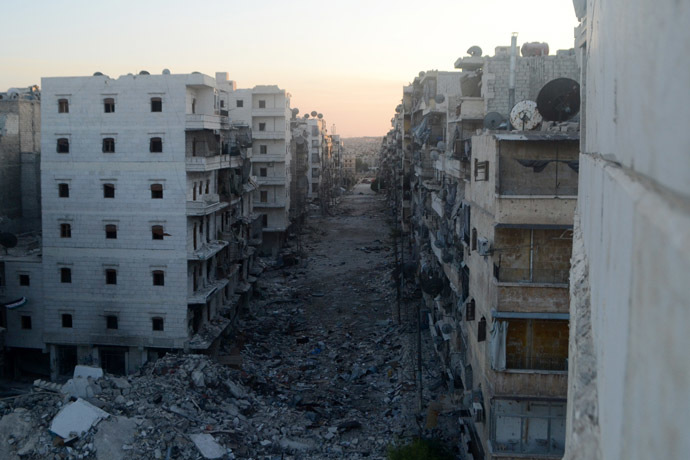
RT:How will a military strike change things? Will it improve the situation for the Syrian people or over-complicate the matter?
AW: I think nations like the US, the UK, France and Turkey need to be very careful about what action to take. We need to be very clear what it is we actually want to achieve, what is the end state we want. We need to have mechanisms in place militarily to ensure things don’t go beyond a certain degree. But I am not at all convinced that an attack would help the people in Syria unless you could guarantee it stops the regime – if the regime is doing it – from using chemical weapons against their own people. If they are, it is a very loathsome thing to be doing.
RT:Government troops are keeping the armies of an Al-Qaeda-linked militia at bay – would these radical elements be happy to see foreign powers attacking their enemies?
AW: We all need to be very careful getting ourselves
involved in events in that Middle Eastern region. We’ve seen what
happened in Iraq and in Afghanistan. I have no doubt that the
Al-Qaeda group, funded by people who haven’t thought through what
this really means, would be delighted if America, Britain, Turkey
and France attacked Assad. But that doesn’t mean they like us,
they oppose us and want to do us harm, but on a temporary basis
that would suit them.
The statements, views and opinions expressed in this column are solely those of the author and do not necessarily represent those of RT.



